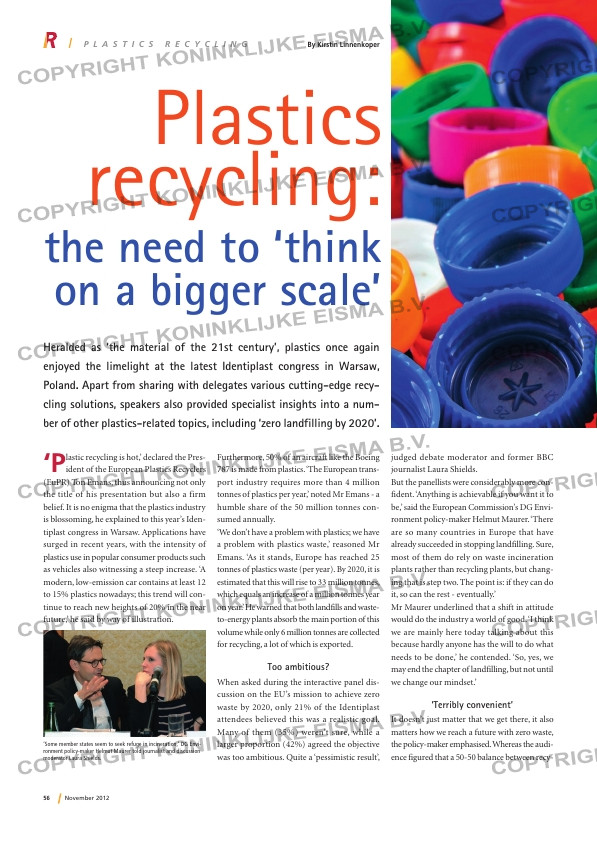Page 56 from: November 2012

56 November 2012
‘Plastic recycling is hot,’ declared the Pres-ident of the European Plastics Recyclers
(EuPR) Ton Emans, thus announcing not only
the title of his presentation but also a firm
belief. It is no enigma that the plastics industry
is blossoming, he explained to this year’s Iden-
tiplast congress in Warsaw. Applications have
surged in recent years, with the intensity of
plastics use in popular consumer products such
as vehicles also witnessing a steep increase. ‘A
modern, low-emission car contains at least 12
to 15% plastics nowadays; this trend will con-
tinue to reach new heights of 20% in the near
future,’ he said by way of illustration.
Furthermore, 50% of an aircraft like the Boeing
787 is made from plastics. ‘The European trans-
port industry requires more than 4 million
tonnes of plastics per year,’ noted Mr Emans – a
humble share of the 50 million tonnes con-
sumed annually.
‘We don’t have a problem with plastics; we have
a problem with plastics waste,’ reasoned Mr
Emans. ‘As it stands, Europe has reached 25
tonnes of plastics waste (per year). By 2020, it is
estimated that this will rise to 33 million tonnes,
which equals an increase of a million tonnes year
on year.’ He warned that both landfills and waste-
to-energy plants absorb the main portion of this
volume while only 6 million tonnes are collected
for recycling, a lot of which is exported.
Too ambitious?
When asked during the interactive panel dis-
cussion on the EU’s mission to achieve zero
waste by 2020, only 21% of the Identiplast
attendees believed this was a realistic goal.
Many of them (35%) weren’t sure, while a
larger proportion (42%) agreed the objective
was too ambitious. Quite a ‘pessimistic result’,
judged debate moderator and former BBC
journalist Laura Shields.
But the panellists were considerably more con-
fident. ‘Anything is achievable if you want it to
be,’ said the European Commission’s DG Envi-
ronment policy-maker Helmut Maurer. ‘There
are so many countries in Europe that have
already succeeded in stopping landfilling. Sure,
most of them do rely on waste incineration
plants rather than recycling plants, but chang-
ing that is step two. The point is: if they can do
it, so can the rest – eventually.’
Mr Maurer underlined that a shift in attitude
would do the industry a world of good. ‘I think
we are mainly here today talking about this
because hardly anyone has the will to do what
needs to be done,’ he contended. ‘So, yes, we
may end the chapter of landfilling, but not until
we change our mindset.’
‘Terribly convenient’
It doesn’t just matter that we get there, it also
matters how we reach a future with zero waste,
the policy-maker emphasised. Whereas the audi-
ence figured that a 50-50 balance between recy-
P l a s t i c s R e c y c l i n g
‘Some member states seem to seek refuge in incineration,’ DG Envi-
ronment policy-maker Helmut Maurer told journalist and discussion
moderator Laura Shields.
Plastics
recycling:
the need to ‘think
on a bigger scale’
Heralded as ‘the material of the 21st century’, plastics once again
enjoyed the limelight at the latest Identiplast congress in Warsaw,
Poland. Apart from sharing with delegates various cutting-edge recy-
cling solutions, speakers also provided specialist insights into a num-
ber of other plastics-related topics, including ‘zero landfilling by 2020’.
By Kirstin Linnenkoper
RI-9-Identiplast.indd 56 12-11-12 13:37



